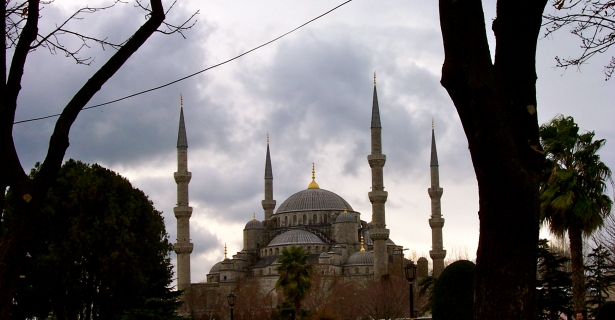Kristin and I just spent ten days in Istanbul to conduct interviews of journalists, scholars, businessmen, and employees of human rights NGOs. This trip was part of a project we have been working on with the help of other students from the Poverty and Power Research Initiative for about a year. As a group we chose to look into the power transition in Turkey between a secularist order backed by the military and a more conservative power group centered around the AKP and the network built by the imam Fethullah Gülen, who is currently living in the United States in self-imposed exiled [1]. This led us to focus on the emerging power structures in the media, and their influence on journalists.
We had two objectives for this trip to Istanbul. The first one was to meet as many people as possible in order to get a variety of opinions about the state of the media, its evolution, its role in Turkish society, and its interactions with politics and the business worlds. The second objective was to leave the country with a clear understanding of these complicated issues, one that would confirm the opinions we had formed over the past year about who were the good guys, the bad guys, and what needed to be done to save the Turkish media.
The first objective was reached, and I think we even surpassed our expectations. We met with famous columnist Kerim Balci who writes for the conservative media group Zaman, which owns the most sold daily in Turkey and is funded by the Gülen Movement. Mr. Balci invited us to the group’s brand new modern glass building, which is one that any journalist would dream to work in. Later that same day we met in a small bookshop/café with Adnan Bostancioglu, a freelance journalist who writes for the small independent leftist newspaper BirGün. He proposed to put us in contact with his friend, Ahmet Sik, the reporter who became internationally famous after spending a year in jail for writing an unpublished book about the Gülen Movement infiltrating the police forces.
Both agreed that Turkey is not a perfect democracy, but Mr. Balci saw many improvements in the past years, believed that anything can be investigated, and nearly every opinion can now be expressed in the media, while Mr. Bostancioglu talked to us about the intimidation of the government, the importance of money in the media, and what he considered to be absurd allegations of terrorism made against fellow reporters. The differences in Mr. Balci and Mr. Bostancioglu’s opinions illustrate the diversity of opinions we collected over ten days. This diversity did not help Kristin and I come up with a clear answer about freedom of expression in Turkey, but brought out many of the nuances and historical influence that constitute modern Turkey, its media sector, and political system.
I would like to point out that it is futile to apply American standards of democracy and human rights in Turkey. The country went through military coups in 1960, 1971, 1980, and 1997 during which the media often played a critical role. In fact, state control of the media was very important under military regimes, and one person we met told us, “Before they used to kill journalists, now they imprison them. That’s an improvement!” In addition, it did not take us long to understand that the problem with freedom of expression depicted by NGOs like Reporters Without Borders is in fact closely linked to the Kurdish issue. Most of the imprisoned journalists are Kurdish and are being tried for terrorism because of the columns and news reports they wrote. Some of our interviewees were outraged that the government arrested them, but others told us it reassures them to know these journalists could no longer write. Their opinion greatly depended on how they weighed freedom of expression in comparison to national security.
Talking about our research topic to contrasting individuals in Istanbul was an amazing experience, but it certainly did not help us stabilize the impressions we had before traveling. The people’s answers to our questions depended on where they stood on the Turkish political spectrum, how they understood Turkish citizenship, how they defined freedom of speech, whether they placed security over freedom of speech, and many other criteria. We did not fulfill the second objective of our trip, but I think it is for the best because we left the country with a much more complex and nuanced understanding of Turkey that books in the Tisch Library could not have helped us reach.
[1] No one really knows how to describe Gulen’s following. We have heard “organization”, “religious association”, “set of values”, “network of professional”…. I chose to use the word "Movement."


Add new comment